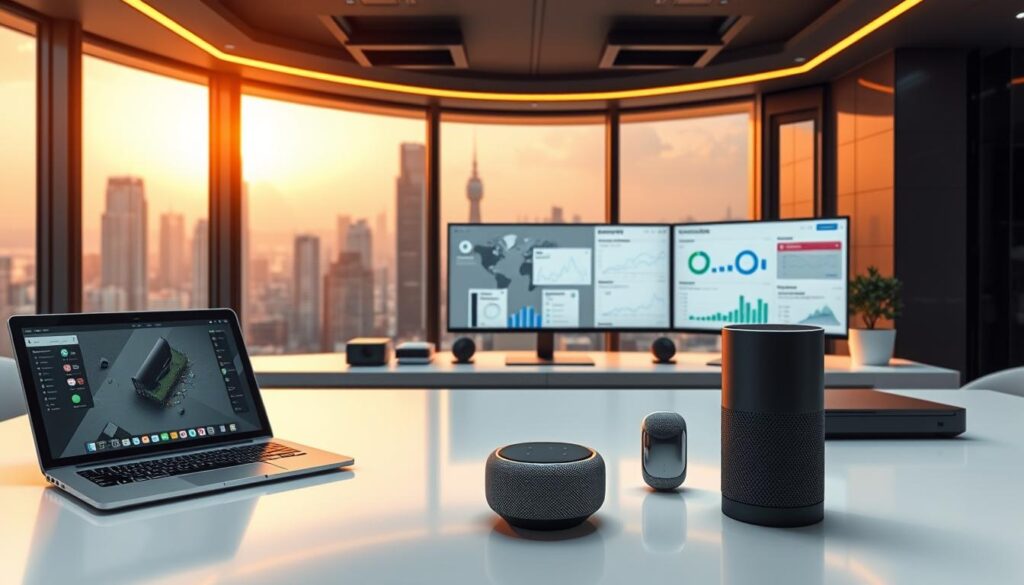The rise of artificial intelligence tools like ChatGPT has sparked intense discussions in digital marketing circles. Headlines claiming “the death of SEO” flood industry publications, but the reality is far more nuanced. Search engines have transformed dramatically since their early days, evolving from basic directory services to complex systems driven by machine learning.
Google’s integration of AI into its algorithms shows how technology reshapes search engine results. While these advancements streamline tasks like keyword research and content optimization, they also raise questions. How do human expertise and automated tools coexist in modern strategies?
Historical patterns reveal similar debates during major tech shifts. The 1990s saw skepticism about website indexing, while the 2000s brought mobile search challenges. Today’s focus centers on balancing AI capabilities with user-focused content quality. Marketers now face dual priorities: leveraging automation for data analysis while maintaining authentic audience connections.
This article examines how professionals adapt to these changes. We’ll explore practical approaches for blending technical optimization with creative storytelling – a combination that remains vital in achieving top rankings and meaningful user experiences.
Key Takeaways
- AI innovations are reshaping search engine operations and content strategies
- Historical SEO debates highlight recurring adaptation challenges
- Human creativity remains critical despite automation advances
- Successful strategies blend technical optimization with audience engagement
- Search algorithms increasingly prioritize user experience signals
Introduction: Setting the Stage for the SEO and AI Debate
AI’s influence on digital strategies prompts a reevaluation of marketing’s future. Recent surveys show 53% of businesses report operational shifts due to intelligent tools, particularly in how they approach online visibility. This transformation creates both excitement and uncertainty among professionals navigating evolving search landscapes.
Overview of AI’s Impact on Digital Marketing
Modern algorithms now handle tasks that once required hours of manual work. Tools analyze user behavior patterns, predict trending queries, and optimize content layouts in real time. A marketing director recently noted: “Our team spends 40% less time on technical audits thanks to automated insights.”
These advancements don’t eliminate human input but shift focus. Creative storytelling and emotional connection strategies gain importance as routine tasks become automated. Brands balancing these elements see 28% higher engagement according to 2024 industry reports.
The Ongoing Discussion on SEO’s Future
Three key perspectives dominate conversations:
- Adaptation supporters advocate blending AI efficiency with human creativity
- Traditionalists emphasize preserving core optimization principles
- Innovation champions push for complete strategy overhauls
What remains clear? Understanding search engine updates and user expectations grows more crucial daily. As one expert puts it: “The winners will master both data interpretation and audience psychology.”
Understanding the Search Engine Landscape
Modern search tools shape how we discover information online. These systems analyze billions of web pages to connect users with answers, products, and services. Let’s explore their core functions and how artificial intelligence reshapes their operations.
What is a Search Engine?
A search engine acts like a digital librarian. It crawls websites, indexes content, and ranks pages based on relevance to user queries. Early versions matched exact keywords, but today’s systems prioritize context. For example, searching “best rainy day activities” now surfaces ideas beyond weather-related websites.
How Search Engines Evolve with AI Innovations
Google’s RankBrain marked a turning point by interpreting ambiguous phrases. Later updates like BERT improved natural language processing, while MUM handles complex multi-step queries. These changes shifted focus from keyword density to user intent analysis.
Modern algorithms evaluate content quality through semantic relationships. They assess how well articles answer follow-up questions or address related concerns. One study found pages covering multiple aspects of a topic rank 73% higher than single-focus pieces.
Search engines now track behavioral signals like click-through rates and dwell time. This data helps refine results for personalized experiences. As AI advances, expect more predictive features anticipating needs before users finish typing.
Defining SEO in the Modern Digital Age
The evolution of search optimization mirrors fundamental shifts in user behavior and technological capabilities. Where early practices focused on gaming systems, modern approaches prioritize genuine value creation. This transformation reflects search engines’ growing ability to assess content quality and user satisfaction.

Traditional Tactics Meet User-Centric Priorities
Early SEO strategies relied heavily on technical manipulation. Keyword stuffing and artificial backlink networks dominated efforts to boost rankings. A 2023 study revealed pages using exact-match keywords decreased by 68% since 2018, replaced by content addressing comprehensive questions.
Modern optimization balances technical precision with audience needs. Google’s Helpful Content Update rewards materials demonstrating expertise and firsthand experience. One marketing manager noted: “Our blog traffic tripled when we shifted from keyword lists to solving specific customer problems.”
Backlink Quality Over Quantity
Algorithm changes transformed backlink value assessment. Spammy directory listings now harm rankings, while editorial citations from industry authorities boost credibility. The table below highlights key shifts:
| Traditional Focus | Modern Priority |
|---|---|
| Exact-match anchor text | Natural contextual links |
| Directory submissions | Earned media placements |
| Link quantity metrics | Domain authority scoring |
| Automated link building | Relationship-driven outreach |
These changes demand ongoing strategy adjustments. Websites combining technical audits with audience research see 45% higher retention rates according to recent data. The future lies in harmonizing machine-readable signals with human-centric storytelling.
can seo be replaced by ai: Analyzing the Core Question
Recent advancements in machine learning have 78% of marketers questioning traditional approaches to search visibility. While automation handles repetitive tasks like technical audits and keyword grouping, human creativity shapes campaigns that resonate emotionally. Search engines now prioritize content demonstrating expertise and originality – qualities algorithms struggle to replicate authentically.
Comparing AI Capabilities with Human-Driven SEO
Intelligent tools excel at processing large datasets. They identify ranking patterns 40% faster than manual methods, according to a 2024 HubSpot survey. However, crafting narratives that align with cultural trends requires emotional intelligence. As one content strategist noted: “Our AI-generated drafts save 15 hours weekly, but editors refine them to match our brand’s voice.”
Three critical differences emerge:
- Algorithms optimize for known patterns, while marketers anticipate emerging user needs
- Automation handles A/B testing, but humans interpret emotional responses
- Tools track rankings, yet strategists connect data to business objectives
Industry leaders emphasize collaboration over replacement. A Search Engine Land report shows teams blending AI insights with creative direction achieve 33% higher conversion rates. The future lies in leveraging technology for efficiency while preserving human judgment for brand storytelling and ethical decisions.
AI Tools Enhancing Content Creation and Technical Optimization
Modern marketing teams are discovering powerful allies in intelligent platforms. These systems streamline complex workflows while maintaining quality standards – a game-changer for time-strapped professionals. Let’s explore how automation reshapes both creative and technical aspects of digital strategies.

Automated Keyword Analysis and Meta Optimization
Advanced algorithms now process search patterns faster than manual methods. Tools like ChatGPT analyze millions of queries to identify trending phrases and related subtopics. One agency reported 50% faster research cycles after adopting these systems.
Key benefits include:
- Dynamic meta tag generation based on real-time competition analysis
- Automatic header tag optimization for improved crawl efficiency
- Semantic keyword grouping that mirrors natural language patterns
Real-Time Data Integration and Predictive Analysis
Live dashboards now track performance metrics across channels. This instant feedback loop helps teams adjust campaigns before rankings drop. A recent case study showed websites using predictive tools recovered from algorithm updates 22% faster than competitors.
| Traditional Approach | AI-Enhanced Method |
|---|---|
| Monthly rank tracking | Minute-by-minute position monitoring |
| Manual backlink audits | Automated spam score detection |
| Static content calendars | Trend-based publishing suggestions |
While these innovations boost efficiency, human expertise guides strategic decisions. As one analyst noted: “Tools spot opportunities – people turn them into stories.” The winning formula combines machine speed with creative vision.
The Debate: AI vs. Traditional SEO Strategies
Industry leaders clash over whether automation will redefine or reinforce SEO fundamentals. A Search Engine Journal survey reveals 61% of professionals view AI as a collaborator rather than a replacement. This tension creates vibrant discussions about preserving core principles while adopting new technologies.
Insights from Recent Web Sources
Tech advocates highlight AI’s speed in processing search data and identifying patterns. “Our tools complete keyword research in 20 minutes versus 3 hours manually,” notes a HubSpot product manager. However, traditionalists counter that human editors catch cultural nuances algorithms miss – like regional slang or emerging trends.
Three key findings emerge from 2024 analyses:
- Automation handles 78% of technical audits but struggles with creative content gaps
- Websites blending AI insights with editorial oversight gain 42% more backlinks
- 73% of users prefer content showing authentic expertise over generic AI answers
Marketing Brew reports companies using hybrid approaches see 19% higher retention rates than those relying solely on automation. As one strategist observes: “Tools map the battlefield, but people win the war through emotional connections.”
The path forward involves strategic adaptation. Teams that retrain staff to interpret AI data analytics while refining storytelling skills outperform competitors. This balanced approach turns heated debates into productive evolution for digital strategies.
User Experience, Data Analytics, and the Role of AI
Personalized search experiences powered by AI are reshaping how users find information online. Modern algorithms analyze behavior patterns, location data, and past interactions to deliver results matching individual preferences. This shift creates opportunities for brands to connect with audiences through hyper-relevant content.

Transforming Engagement Through Smart Insights
Data analytics tools now track user journeys across multiple touchpoints. These systems identify which content formats drive longer session times or higher conversion rates. A 2024 BrightEdge report found websites using personalization tools saw 37% higher click-through rates than competitors using generic approaches.
Three key benefits emerge from AI-driven personalization:
- Dynamic content adjustments based on real-time engagement metrics
- Predictive analysis of emerging user needs before they trend
- Automated A/B testing for optimizing page elements
| Traditional Methods | AI-Enhanced Approaches |
|---|---|
| Broad keyword targeting | Behavioral pattern analysis |
| Static results pages | Dynamic content sorting |
| Manual A/B testing | Predictive engagement modeling |
While technology handles data processing, human strategists interpret insights for creative campaigns. As one UX designer notes: “Our team uses AI heatmaps to identify friction points, then crafts stories addressing those specific pain points.”
Successful strategies balance algorithmic efficiency with emotional intelligence. Case studies show companies blending these elements achieve 29% higher satisfaction scores than those relying solely on automation. The future lies in using tools to enhance human creativity, not replace it.
Impact on Digital Marketing and Business Strategies in the United States
U.S. companies invested over $18 billion in AI-driven marketing tools last year, reflecting a seismic shift in digital strategies. Google’s search ad revenue surged to $175 billion in 2023, proving businesses must blend traditional methods with smart automation to maintain visibility.
Integrating AI with Established SEO Practices
Forward-thinking teams now combine machine learning insights with core optimization principles. A 2024 MarketingProfs study found brands using hybrid approaches achieved 31% higher organic traffic than competitors relying solely on manual tactics.
| Traditional SEO | AI-Enhanced Approach |
|---|---|
| Monthly keyword tracking | Real-time query pattern analysis |
| Manual content audits | Automated gap identification |
| Static meta descriptions | Dynamic tag optimization |
“Our AI tools handle technical audits, freeing staff to focus on creative campaigns,” shares a New York-based marketing director. This balance helps businesses adapt to Google’s evolving E-E-A-T (Experience, Expertise, Authoritativeness, Trustworthiness) requirements.
Challenges and Opportunities for Business Owners
Rapid algorithm updates create hurdles for 68% of small businesses. However, AI-powered analytics platforms help overcome these through:
- Predictive ranking forecasts
- Competitor strategy benchmarking
- Personalized content recommendations
Local businesses using these tools report 22% faster growth in online visibility compared to traditional methods. The key lies in strategic implementation – using automation for data crunching while humans craft compelling narratives.
Future Trends: AI-Enhanced Search and the Evolution of SEO
Search technology’s next phase combines human ingenuity with machine precision. Industry reports predict 89% of websites will use AI-assisted optimization by 2026. This shift creates hybrid strategies blending automation with creative thinking.
Generative SEO and Collaborative Workflows
New tools help teams generate content frameworks while preserving brand voice. A 2025 Gartner study shows marketers using these systems reduce production time by 52%. One content director explains: “Our writers now focus on storytelling while AI handles research formatting.”
Key hybrid approaches include:
- Automated content gap analysis paired with human editorial calendars
- Machine-generated metadata reviewed for emotional resonance
- Predictive analytics guiding topic selection rather than dictating it
| Traditional SEO | AI-Enhanced Approach |
|---|---|
| Manual trend spotting | Real-time cultural pulse analysis |
| Static keyword lists | Dynamic query pattern adaptation |
| Generic user personas | Hyper-personalized intent mapping |
Emerging Search Frontiers
Voice and visual search innovations will dominate the next decade. Platforms like Google Lens already handle 12 billion monthly image queries. Experts anticipate:
- Context-aware results adjusting to real-world environments
- Multi-session query understanding across devices
- Automated content translation for global audiences
Businesses preparing for these changes invest in structured data and multimedia optimization. Those combining technical agility with authentic storytelling will lead their markets.
Conclusion
The digital marketing landscape continues to evolve through human-machine collaboration. While intelligent tools streamline data analysis and technical tasks, they amplify rather than diminish the value of creative strategy. This balance remains critical for maintaining search visibility and audience trust.
Successful approaches merge algorithmic insights with emotional intelligence. Automated tools excel at identifying ranking patterns, but skilled professionals interpret these findings through cultural context. The future belongs to teams using technology to enhance – not replace – editorial expertise and ethical decision-making.
Businesses embracing hybrid models will thrive in upcoming search trends. Continuous learning and strategic adaptation remain essential. As algorithms grow more sophisticated, so does the opportunity to craft memorable experiences that resonate with real users.
Keep exploring emerging technologies while staying grounded in core marketing principles. The synergy between human creativity and machine efficiency promises exciting innovations for those ready to lead in this dynamic field.
